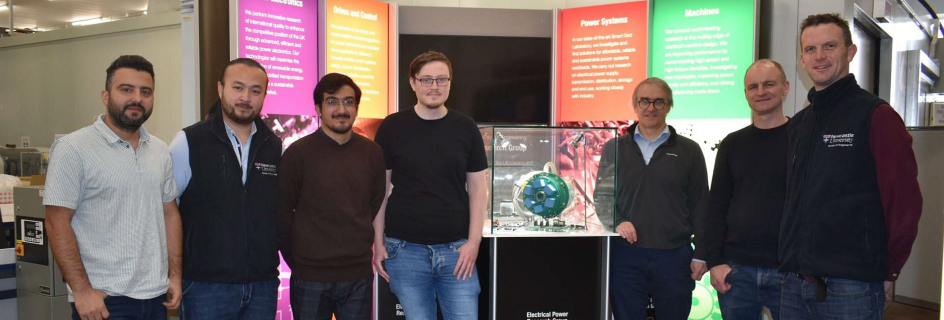Post date:
The School’s Professor Markus Mueller is working on a project with Newcastle University to demonstrate the advantages of using electric power technologies in wave energy converters.
The MU-EDRIVE project is part of eight projects funded by the Engineering and Physical Sciences Research Council (EPSRC), part of UK Research and Innovation (UKRI), to build on the UK’s leading role in marine wave energy.
Led by Newcastle University’s Dr Nick Baker, MU-EDRIVE is a collaboration between Dr Serkan Turkman and Professor Jeff Neasham at Newcastle University and Professor Mueller at the University of Edinburgh.
Wave energy conversion
Wave energy is a concentrated form of solar energy. The sun heats land which results in hot air rising and causing wind, as the wind blows across the sea surface, it creates the oscillating up-down movement which can be used to generate electricity.
Wave energy convertors (WECs) are mechanical devices used to harvest this kinetic energy to generate sustainable and renewable electric power.
Compared to electrical machines in other industrial sectors, however, WECs are relatively slow running. The team is now working to develop all electric drivetrain technologies – which are efficient and mechanically simple – to power WECs, and demonstrate that they can perform efficiently at full-scale in harsh underwater conditions.
Testing the idea at sea
The Edinburgh team, led by Professor Mueller, will design, build and test a magnetic gear in partnership with Edinburgh-based wave energy developer Mocean Energy to demonstrate upscaling of electrical power take off systems.
The team will then install a generator and power converter using the new system to a buoy mounted 3km off the Northumberland coast at Blyth in spring 2024 for a 12-month period.
Once installed, the prototype WEC will provide vital operational data while testing the newest corrosion and anti-fouling technologies – which prevent sea organisms such as algae sticking to the device and potentially interfering with its operation.
The project will progress understanding of the robustness of wave energy convertors in harsh underwater conditions, while showing how magnetic gearing technology can be scaled up to larger power levels and integrated more fully into wave energy converters.
Net zero goal
Dr Nick Baker, Reader in Emerging Electrical Machines and Senior Lecturer at Newcastle University, commented:
“With regards to achieving the ambitious goal of net zero by 2050, it is essential to look at the energy system as a whole. Wave energy originates from solar energy as the sun heats the land, the land heats the air to create wind and wind creates waves. Wave energy can therefore be considered as ‘energy dense’ and could be a significant factor in moving away from traditional energy sources.
"The upscaling aim of the MU-EDRIVE project will help to reduce costs of energy production as devices get larger, making the energy both easier and more affordable for access and usage. It's hard to know what a wave energy device will look like in 10 years' time. Thinking back to 10 years ago, offshore wind turbine technologies were in their infancy - this could be the same for wave energy now.”
Driving the electric revolution
Recent government recognition has led to a surge in skills and advanced technology across the Power Electronics Machines and Drives (PEMD) sectors, and the natural pathway is to apply these skills to the marine energy sector.
Knowledge gained from the electrification of the automotive industry, such as developing motors and generators, could easily transfer into the marine energy market.
This cross-sector collaboration in PEMD is supported by Driving the Electric Revolution Industrialisation Centres (DER-IC), a UK-wide network in which the University of Edinburgh and Newcastle University are partners. DER-IC aims to support the growth of the PEMD supply chain in the UK, by providing access to world-class design, manufacturing, test and validation capability across 30 Universities and Research and Technology Organisations.
These new facilities will be used to scale up the MU-EDRIVE project and streamline its manufacturing processes.



